Related Research Articles
Aquaculture, also known as aquafarming, is the controlled cultivation ("farming") of aquatic organisms such as fish, crustaceans, mollusks, algae and other organisms of value such as aquatic plants. Aquaculture involves cultivating freshwater, brackish water, and saltwater populations under controlled or semi-natural conditions and can be contrasted with commercial fishing, which is the harvesting of wild fish. Aquaculture is also a practice used for restoring and rehabilitating marine and freshwater ecosystems. Mariculture, commonly known as marine farming, is aquaculture in seawater habitats and lagoons, as opposed to freshwater aquaculture. Pisciculture is a type of aquaculture that consists of fish farming to obtain fish products as food.

The Food and Agriculture Organization of the United Nations (FAO) is a specialized agency of the United Nations that leads international efforts to defeat hunger and improve nutrition and food security. Its Latin motto, fiat panis, translates to "let there be bread". It was founded on 16 October 1945.

Fishery can mean either the enterprise of raising or harvesting fish and other aquatic life or, more commonly, the site where such enterprise takes place. Commercial fisheries include wild fisheries and fish farms, both in freshwater waterbodies and the oceans. About 500 million people worldwide are economically dependent on fisheries. 171 million tonnes of fish were produced in 2016, but overfishing is an increasing problem, causing declines in some populations.
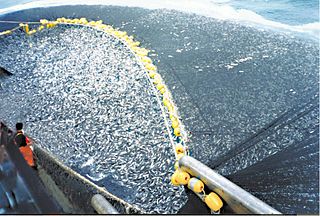
Overfishing is the removal of a species of fish from a body of water at a rate greater than that the species can replenish its population naturally, resulting in the species becoming increasingly underpopulated in that area. Overfishing can occur in water bodies of any sizes, such as ponds, wetlands, rivers, lakes or oceans, and can result in resource depletion, reduced biological growth rates and low biomass levels. Sustained overfishing can lead to critical depensation, where the fish population is no longer able to sustain itself. Some forms of overfishing, such as the overfishing of sharks, has led to the upset of entire marine ecosystems. Types of overfishing include growth overfishing, recruitment overfishing, and ecosystem overfishing. Overfishing not only causes negative impacts on biodiversity and ecosystem functioning, but also reduces fish production, which subsequently leads to negative social and economic consequences.
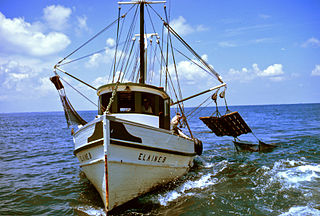
The fishing industry includes any industry or activity that takes, cultures, processes, preserves, stores, transports, markets or sells fish or fish products. It is defined by the Food and Agriculture Organization as including recreational, subsistence and commercial fishing, as well as the related harvesting, processing, and marketing sectors. The commercial activity is aimed at the delivery of fish and other seafood products for human consumption or as input factors in other industrial processes. The livelihood of over 500 million people in developing countries depends directly or indirectly on fisheries and aquaculture.

Whiteleg shrimp, also known as Pacific white shrimp or King prawn, is a species of prawn of the eastern Pacific Ocean commonly caught or farmed for food.
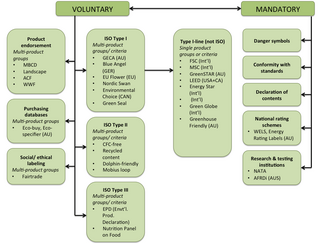
Ecolabels and Green Stickers are labeling systems for food and consumer products. The use of ecolabels is voluntary, whereas green stickers are mandated by law; for example, in North America major appliances and automobiles use Energy Star. They are a form of sustainability measurement directed at consumers, intended to make it easy to take environmental concerns into account when shopping. Some labels quantify pollution or energy consumption by way of index scores or units of measurement, while others assert compliance with a set of practices or minimum requirements for sustainability or reduction of harm to the environment. Many ecolabels are focused on minimising the negative ecological impacts of primary production or resource extraction in a given sector or commodity through a set of good practices that are captured in a sustainability standard. Through a verification process, usually referred to as "certification", a farm, forest, fishery, or mine can show that it complies with a standard and earn the right to sell its products as certified through the supply chain, often resulting in a consumer-facing ecolabel.
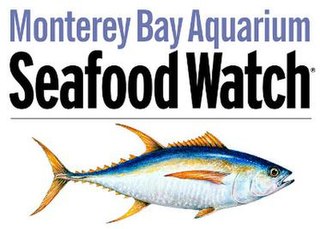
Seafood Watch is a sustainable seafood advisory list, and has influenced similar programs around the world. It is best known for developing science-based seafood recommendations that consumers, chefs, and business professionals use to inform their seafood purchasing decisions.
Sustainable seafood is seafood that is caught or farmed in ways that consider the long-term vitality of harvested species and the well-being of the oceans, as well as the livelihoods of fisheries-dependent communities. It was first promoted through the sustainable seafood movement which began in the 1990s. This operation highlights overfishing and environmentally destructive fishing methods. Through a number of initiatives, the movement has increased awareness and raised concerns over the way our seafood is obtained.
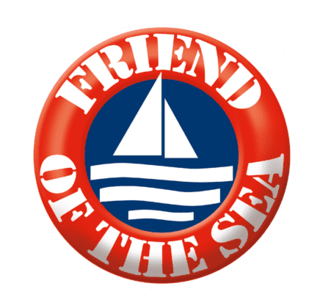
Friend of the Sea is a project of the World Sustainability Organization for the certification and promotion of seafood from sustainable fisheries and sustainable aquaculture. It is the only certification scheme which, with the same logo, certifies both wild and farmed seafood.
The Global Food Safety Initiative (GFSI) is a private organization that works as a "coalition of action" from the Consumer Goods Forum (CGF) and brings together retailers and brand owners (manufacturers) from across the CGF membership. The GFSI operates under multi-stakeholder governance, with the objective to create "an extended food safety community to oversee food safety standards for businesses and help provide access to safe food for people everywhere". GFSI's work in benchmarking and harmonization aims to foster mutual acceptance of GFSI-recognized certification programs across the industry, with the ambition to enable a "once certified, accepted everywhere" approach.
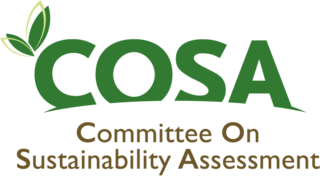
The Committee on Sustainability Assessment (COSA) is a global consortium of development institutions that work collaboratively to advance sustainability learning with systematic and science-based measurement. COSA applies a pragmatic and collective approach for using scientific methods to develop indicators, tools, and technologies to measure the distinct social, environmental, and economic impacts and are applied in performance monitoring, evaluation, return on investment (ROI) calculation, and impact assessment. COSA has a public mission to open its scientific methods and metrics up to widespread use.
Sustainability standards and certifications are voluntary guidelines used by producers, manufacturers, traders, retailers, and service providers to demonstrate their commitment to good environmental, social, ethical, and food safety practices. There are over 400 such standards across the world.

Living Oceans Society is a Canadian environmental organization that has been a leader in the effort to protect Canada's oceans since 1998. It is based in Sointula, British Columbia, with a satellite office in Vancouver, British Columbia. Living Oceans Society's vision states that: "Canada's oceans are sustainably managed and thriving with abundant sea life that supports vibrant and resilient communities."
The following outline is provided as an overview of and topical guide to fisheries:

Blue economy is a term in economics relating to the exploitation, preservation and regeneration of the marine environment. Its scope of interpretation varies among organizations. However, the term is generally used in the scope of international development when describing a sustainable development approach to coastal resources and ocean development. This can include a wide range of economic sectors, from the more conventional fisheries, aquaculture, maritime transport, coastal, marine and maritime tourism, or other traditional uses, to more emergent activities such as coastal renewable energy, marine ecosystem services, seabed mining, and bioprospecting.
Gfresh is a global online business-to business seafood marketplace with integrated shipping, payment, customs and quality assurance services.
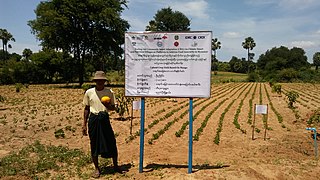
Climate-smart agriculture (CSA) is a set of farming methods that has three main objectives with regards to climate change. Firstly, they use adaptation methods to respond to the effects of climate change on agriculture. Secondly, they aim to increase agricultural productivity and to ensure food security for a growing world population. Thirdly, they try to reduce greenhouse gas emissions from agriculture as much as possible. Climate-smart agriculture works as an integrated approach to managing land. This approach helps farmers to adapt their agricultural methods to the effects of climate change.

Sustainable Development Goal 2 aims to achieve "zero hunger". It is one of the 17 Sustainable Development Goals established by the United Nations in 2015. The official wording is: "End hunger, achieve food security and improved nutrition and promote sustainable agriculture". SDG 2 highlights the "complex inter-linkages between food security, nutrition, rural transformation and sustainable agriculture". According to the United Nations, there were up to 757 million people facing hunger in 2023 – one out of 11 people in the world, which accounts for slightly less than 10 percent of the world population. One in every nine people goes to bed hungry each night, including 20 million people currently at risk of famine in South Sudan, Somalia, Yemen and Nigeria.
Blue foods, also known as aquatic foods, are plants and animals sourced from aquatic environments and are suitable for human consumption. More than 2500 species of marine and freshwater animals, aquatic plants, and algae have been identified as relevant to the human diet.
References
- ↑ Bush, Simon R.; Oosterveer, Peter (2019-01-08). Governing Sustainable Seafood. Routledge. ISBN 978-1-317-70246-7.
- ↑ Pradhan, Naresh C.; Cai, Junning; Stohs, Stephen M. (2020-11-06). Seafood Sustainability - Series I. MDPI. ISBN 978-3-03936-294-3.
- ↑ Savage, Steven. "How Sustainable Farming On Land And Sea Can Work Together To Meet Our Growing Need For Protein". Forbes. Retrieved 2023-10-08.
- ↑ "A Global Partnership supporting the operationalization of internationally agreed codes and guidelines for the seafood sector | Department of Economic and Social Affairs". sdgs.un.org. Retrieved 2023-10-08.
- ↑ "Our Partners". GSSI. Retrieved 2023-10-08.
- ↑ The Role of Certification in Rewarding Sustainable Fishing: Hearing Before the Subcommittee on Oceans, Atmosphere, Fisheries, and Coast Guard of the Committee on Commerce, Science, and Transportation, United States Senate, One Hundred Thirteenth Congress, First Session. U.S. Government Printing Office. 2014.
- ↑ THE 2030 AGENDA AND THE SUSTAINABLE DEVELOPMENT GOALS: THE CHALLENGE FOR AQUACULTURE DEVELOPMENT AND MANAGEMENT. Food and Agriculture Organization of the United Nations. 2018. ISBN 978-92-5-109928-5.
- ↑ "What we do". GSSI. Retrieved 2023-10-08.
- ↑ Yang, Tseming; Telesetsky, Anastasia; Harmon-Walker, Lin; Percival, Robert V. (2019-09-13). Comparative and Global Environmental Law and Policy. Aspen Publishing. ISBN 978-1-5438-1518-4.
- ↑ "Benchmarking". GSSI. Retrieved 2023-10-08.
- ↑ SEAFOOD CERTIFICATION AND DEVELOPING COUNTRIES:: FOCUS ON ASIA. Food and Agriculture Organization of the United Nations. 2018. ISBN 978-92-5-109993-3.
- ↑ Develle, Laurent (2023-05-19). "How the GSSI's Seafood MAP is supporting sustainable seafood". The Fish Site. Retrieved 2023-10-08.
- ↑ Report of the Global Conference on Aquaculture for Food and Sustainable Development: Shanghai, the People's Republic of China, 22–25 September 2021. Food and Agriculture Organization of the United Nations. 2022-04-08. ISBN 978-92-5-135986-0.